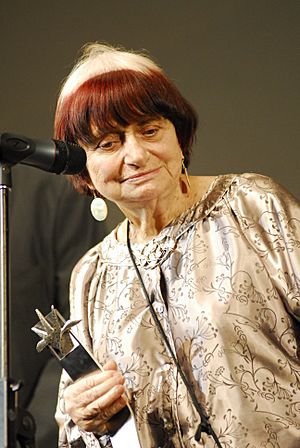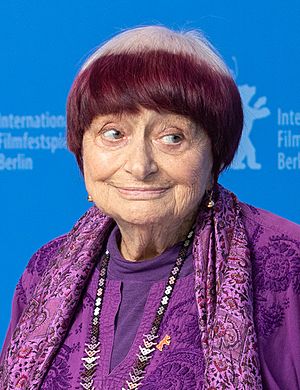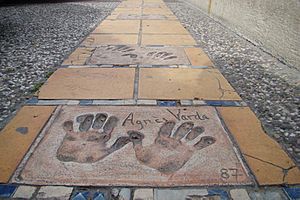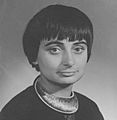Agnès Varda facts for kids
Quick facts for kids
Agnès Varda
|
|
|---|---|
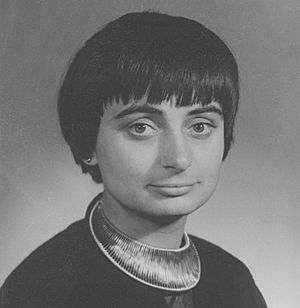
Varda in 1962
|
|
| Born |
Arlette Varda
30 May 1928 Ixelles, Brussels, Belgium
|
| Died | 29 March 2019 (aged 90) Paris, France
|
| Occupation | Director, screenwriter, editor, actor, producer, installation artist, photographer |
| Years active | 1951–2019 |
|
Notable work
|
|
| Spouse(s) | |
| Children | Rosalie Varda Mathieu Demy |
Agnès Varda (born Arlette Varda; 30 May 1928 – 29 March 2019) was a famous film director, writer, and artist from France, born in Belgium. She was a very important part of the French New Wave film movement in the 1950s and 1960s. This movement changed how movies were made in France.
Varda's films often felt like documentaries, showing real life and focusing on issues important to women and society. She had a unique, experimental style. She liked to film outside in real places, even when it was hard to record sound there. She also used regular people, not just professional actors, which was unusual for French movies in the 1950s.
Some of her most well-known films include La Pointe Courte (1955), Cléo from 5 to 7 (1962), and Vagabond (1985). She also made many documentaries like The Gleaners and I (2000) and Faces Places (2017).
Famous director Martin Scorsese called Varda "one of the Gods of Cinema." She won many awards, including an Honorary Palme d'Or at the Cannes Film Festival and an Academy Honorary Award. She was the first female director to receive an honorary Oscar.
Contents
- Agnès Varda's Early Life and Education
- Agnès Varda's Photography Career
- Agnès Varda's Filmmaking Journey
- La Pointe Courte (1954): Varda's First Film
- Cléo from 5 to 7 (1961): A Woman's Journey
- Ciné-Tamaris: Varda's Own Film Company (1977)
- Vagabond (1985): A Drifter's Story
- Jacquot de Nantes (1991): A Tribute to Her Husband
- The Gleaners and I (2000): Finding Value in What's Left Behind
- Faces Places (2017): Art and Friendship on the Road
- Agnès Varda's Unique Style and Influences
- Agnès Varda's Personal Life and Death
- Agnès Varda's Awards and Honors
- Agnès Varda's Filmography
- See Also
- Images for kids
Agnès Varda's Early Life and Education
Agnès Varda was born Arlette Varda on May 30, 1928, in Ixelles, Brussels, Belgium. Her mother was from France, and her father came from a Greek family. She was one of five children. When she was 18, she officially changed her first name to Agnès. During World War II, her family lived on a boat in a town called Sète.
Varda went to school in Paris and earned a degree in literature and psychology from the Sorbonne. She later said that moving to Paris was difficult for her.
Agnès Varda's Photography Career
Varda first wanted to work in museums, so she studied art history. But then she decided to study photography instead. She started her career as a photographer before becoming a major filmmaker. She often mixed her photography and filmmaking, saying, "I take photographs or I make films. Or I put films in the photos, or photos in the films."
She started earning money by taking pictures of families and weddings. But she also wanted to create "compositions" that asked questions through their design and meaning. In 1951, she became the official photographer for the Théâtre National Populaire, a famous theater. She worked there for ten years, and her reputation grew, leading to photo-journalist jobs across Europe.
Sometimes, her photographs even inspired her movies. For her first film, La Pointe Courte, she took pictures of everything she wanted to film. These photos were like models for her movie shots. She used her photography experience to decide where to place the camera and how to light scenes.
Agnès Varda's Filmmaking Journey
Varda's filmmaking career began before the French New Wave movement, but her work shared many of its ideas. She said she knew very little about making movies and had only seen about 20 films by the time she was 25. She wrote her first movie script and then decided to try and film it with friends. She found filmmaking challenging because it wasn't as free as writing a book.
La Pointe Courte (1954): Varda's First Film
Varda loved photography but wanted to try making films. She filmed the small French fishing town of La Pointe Courte for a sick friend. This experience made her decide to make her first feature film, La Pointe Courte, in 1954. The movie is about a couple working through their problems in a fishing town. It's seen as an early example of the French New Wave style.
Varda was interested in how people's personalities connect with objects around them. In La Pointe Courte, she used both professional actors and real people from the fishing town. This mix of fiction and documentary became a common style in her films.
The film was edited by her friend, filmmaker Alain Resnais. Critics praised La Pointe Courte. One critic said it had "total freedom" in its style. Another called it "an experimental work, ambitious, honest and intelligent." Varda said the film was a big surprise because she was a young woman director, which was very rare at the time. However, the film didn't make much money, so Varda only made short films for the next seven years.
Many people consider La Pointe Courte to be the very first film of the French New Wave movement. Varda is often called the "grandmother" or "mother" of this movement. Her films often focused on the challenges faced by everyday people, not just powerful figures.
Cléo from 5 to 7 (1961): A Woman's Journey
After La Pointe Courte, Varda made several short documentaries. One of her favorites was L'opéra-mouffe, about a street market, which won an award.
Her film Cléo from 5 to 7 tells the story of a pop singer who waits for two hours to get the results of a medical test. The film is about a woman dealing with the idea of her own death. It also explores how women are often seen as objects by others. Cléo tries to break free from this by changing her appearance. Like her first film, Cléo from 5 to 7 mixes documentary and fictional styles. The movie's runtime is 89 minutes, but it shows events happening between 5 and 7 p.m.
Ciné-Tamaris: Varda's Own Film Company (1977)
In 1977, Varda started her own film company, Ciné-Tamaris. This allowed her to have more control over how her films were made and edited. Later, in 2013, the Los Angeles County Museum of Art held Varda's first art show in America, called Agnès Varda in Californialand. It included sculptures, photos, and short films, inspired by her time in Los Angeles in the 1960s.
Vagabond (1985): A Drifter's Story
In 1985, Varda made Sans toit ni loi (meaning "without roof nor law"), known as Vagabond in English. This drama is about the death of a young female drifter named Mona. An unseen interviewer tries to find out what happened to her by talking to people who saw her last. The film tells Mona's story through many short scenes, each from a different person's point of view. Vagabond is seen as one of Varda's important films about women's issues.
Jacquot de Nantes (1991): A Tribute to Her Husband
In 1991, after her husband Jacques Demy passed away, Varda made the film Jacquot de Nantes. It tells the story of his life and death. The film shows his early life and his love for filmmaking, like animation and set design. Varda also included clips from Demy's films and even footage of him as he was dying. This film continues Varda's theme of accepting death, but it is mostly a loving tribute to her husband and their shared work.
The Gleaners and I (2000): Finding Value in What's Left Behind
Les Glaneurs et la Glaneuse (The Gleaners and I) is a documentary where Varda meets "gleaners." These are people who collect leftover food or items after a harvest or from trash. The film also shows artists who make things from recycled materials. This film was the first time Varda used digital cameras. Its free-flowing style suggests that great things, like art, can still be made from what others leave behind.
Faces Places (2017): Art and Friendship on the Road
In 2017, Varda worked with artist JR to co-direct Faces Places. The film won an award at the 2017 Cannes Film Festival. It follows Varda and JR as they travel around rural France, creating large portraits of the people they meet. Varda was nominated for an Academy Award for Best Documentary Feature for this film, making her the oldest person ever nominated for a competitive Oscar. She didn't think the nomination was that important, saying, "We make films so that you love the film." The movie ends with Varda and JR trying to meet famous director Jean-Luc Godard, but he doesn't show up.
Agnès Varda's Unique Style and Influences
Many of Varda's films feature characters who are often overlooked or outsiders in society. Her films often feel like documentaries. She even made a short film about the Black Panthers after their leader, Huey Newton, was arrested.
Varda believed that all parts of filmmaking – like writing, directing, and filming – should work together to create a clear message. She called her filmmaking method "cinécriture," which means "cinematic writing." She often found new ideas while editing her films, looking for images or dialogue that created a special meaning.
Because she started as a photographer, still images were very important in her films. They could have symbolic meanings or help tell the story. Varda paid close attention to every detail in her films, making sure each part added to the overall message.
Her influences came from art and literature, including Surrealism and writers like William Faulkner.
Varda's Place in the French New Wave
Varda's films are often linked to the "Left Bank" (Rive Gauche) cinema movement, which was part of the French New Wave. This group, including filmmakers like Alain Resnais and Chris Marker, had a more experimental style than other New Wave directors.
Left Bank filmmakers often had backgrounds in documentary filmmaking and were interested in treating film as an art form. Varda and her group combined the real-life feel of documentaries with experimental, artistic approaches. They often worked together. Varda always tried to make films in her own way, not following common rules.
A Feminist Filmmaker
Varda's work is often seen as feminist because she focused on female characters and created a unique female voice in cinema. She said, "I did all that—my photos, my craft, my film, my life—on my terms, my own terms, and not to do it like a man." Even though she wasn't part of any strict feminist groups, Varda often explored women's issues in her films and never changed her style to be more traditional or masculine.
Agnès Varda's Personal Life and Death
In 1958, Agnès Varda met Jacques Demy, who was also a French film director. They got married in 1962 and stayed together until his death in 1990. Varda had two children: a daughter, Rosalie Varda (born 1958), and a son, Mathieu Demy (born 1972). Demy adopted Rosalie. Varda worked with her daughter Rosalie on the Oscar-nominated documentary Faces Places.
Varda passed away from cancer on March 29, 2019, in Paris, at the age of 90. She was buried at Montparnasse Cemetery. Many famous people from the film world attended her funeral.
After her death, many filmmakers shared their sadness and respect. Martin Scorsese said she never followed anyone else's path and that her films were "like no one else's." Barry Jenkins said she lived "FULLY for every moment." Other filmmakers like Ava DuVernay, Guillermo del Toro, and Edgar Wright also paid tribute to her.
Agnès Varda's Awards and Honors
Agnès Varda was a judge at the Cannes Film Festival in 2005 and the Venice Film Festival in 1983. She received many important awards throughout her life.
In 2010, she received the Carosse d'Or award for her lifetime achievements at the Cannes Film Festival. In 2014, she received the Leopard of Honour award at the Locarno Film Festival. She was the second woman to receive this award. In 2015, Varda received an honorary Palme d'Or at Cannes, becoming the first woman to do so.
On November 11, 2017, Varda received an Academy Honorary Award for her contributions to cinema. This made her the first female director to receive such an award. A few months later, she was nominated for the Academy Award for Best Documentary Feature for Faces Places, making her the oldest person ever nominated for a competitive Oscar.
For her 1985 film Vagabond, she won the Golden Lion at the 42nd Venice International Film Festival. In 2009, The Beaches of Agnès won the Best Documentary Film award.
At the time of her death, Varda was the oldest person to be nominated for an Academy Honorary Award and the first female director to receive an honorary Oscar. In 2019, the BBC asked film experts to name the 100 best films by women directors. Varda was the most-named director, with six of her films on the list, including Cléo from 5 to 7 as the number-two entry.
Agnès Varda's Filmography
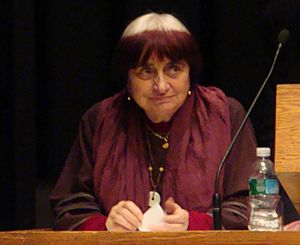
Feature Films by Agnès Varda
| Year | Original title | English title | Credits |
|---|---|---|---|
| 1955 | La Pointe Courte | — | Director, writer |
| 1962 | Cléo de 5 à 7 | Cléo from 5 to 7 | Director, writer |
| 1965 | Le Bonheur | — | Director, writer |
| 1966 | Les Créatures | The Creatures | Director, writer |
| 1967 | Loin du Vietnam | Far from Vietnam | Co-director |
| 1969 | Lions Love | — | Director, writer, producer |
| 1975 | Daguerréotypes | — | Director, writer |
| 1977 | L'Une chante, l'autre pas | One Sings, the Other Doesn't | Director, writer |
| 1981 | Mur Murs | — | Director, writer |
| 1981 | Documenteur | — | Director, writer |
| 1985 | Sans toit ni loi | Vagabond | Director, writer, editor |
| 1988 | Jane B. par Agnès V. | Jane B. by Agnes V. | Director, writer, editor |
| 1988 | Le petit amour | Kung Fu Master | Director, writer |
| 1991 | Jacquot de Nantes | — | Director, writer |
| 1993 | Les demoiselles ont eu 25 ans | The Young Girls Turn 25 | Director, writer |
| 1994 | Les Cent et une nuits de Simon Cinéma | A Hundred and One Nights | Director, writer |
| 1995 | L'univers de Jacques Demy | The World of Jacques Demy | Director, writer |
| 2000 | Les Glaneurs et la glaneuse | The Gleaners and I | Director, writer, producer, editor |
| 2002 | Les Glaneurs et la glaneuse... deux ans après | The Gleaners and I: Two Years Later | Director, producer, editor |
| 2004 | Cinévardaphoto | — | Director, writer |
| 2006 | Quelques veuves de Noirmoutier | Some Widows of Noirmoutier | Director, writer, editor |
| 2008 | Les plages d'Agnès | The Beaches of Agnès | Director, writer, producer, editor |
| 2017 | Visages Villages | Faces Places | Director, writer, editor |
| 2019 | Varda par Agnès | Varda by Agnès | Director, writer, editor |
Short Films by Agnès Varda
| Year | Original title | English title | Credits |
|---|---|---|---|
| 1958 | L'opéra-mouffe | Diary of a Pregnant Woman | Director, writer |
| 1958 | La cocotte d'azur | — | Director, writer |
| 1958 | Du côté de la côte | Along the Coast / Coasting the Coast | Director, writer |
| 1958 | Ô saisons, ô châteaux | — | Director, writer |
| 1961 | Les fiancés du pont MacDonald (Méfiez-vous des lunettes noires) |
— | Director, writer |
| 1963 | Salut les cubains | — | Director |
| 1965 | Elsa la rose | — | Director, writer |
| 1967 | Oncle Yanco | Uncle Yanco | Director, writer |
| 1968 | Black Panthers | — | Director |
| 1975 | Réponse de femmes: Notre corps, notre sexe | Women Reply | Director, writer |
| 1976 | Plaisir d'amour en Iran | — | Director, writer |
| 1982 | Ulysse | — | Director, writer |
| 1984 | Les dites cariatides | The So-Called Caryatids | Director, writer |
| 1984 | 7p. cuis., s. de b., ... à saisir | — | Director, writer |
| 1986 | T'as de beaux escaliers, tu sais | You've Got Beautiful Stairs, You Know | Director, writer |
| 2002 | Hommage à Zgougou (et salut à Sabine Mamou) | Tribute to Zgougou the Cat | Director, writer |
| 2003 | Le lion volatil | — | Director, writer |
| 2004 | Ydessa, les ours et etc. | Ydessa, the Bears and etc. | Director, writer |
| 2004 | Viennale Walzer | Vienna International Film Festival 2004 - Trailer | Director, writer |
| 2005 | Les dites cariatides bis | The So-Called Caryatids 2 | Director, writer |
| 2005 | Cléo de 5 à 7: souvenirs et anecdotes | Cléo from 5 to 7: Remembrances and Anecdotes | Director |
| 2015 | Les 3 Boutons | The Three Buttons | Director, writer |
Television Work by Agnès Varda
| Year | Original title | English title | Credits |
|---|---|---|---|
| 1970 | Nausicaa (TV movie) | — | Director, writer |
| 1983 | Une minute pour une image (TV documentary) | — | Director |
| 2010 | P.O.V., episode 3, season 23, The Beaches of Agnès | — | Director, writer, producer, cinematographer |
| 2011 | Agnès de ci de là Varda, 5 episodes (TV documentary) | — | Director, writer |
See Also
 In Spanish: Agnès Varda para niños
In Spanish: Agnès Varda para niños
Images for kids


